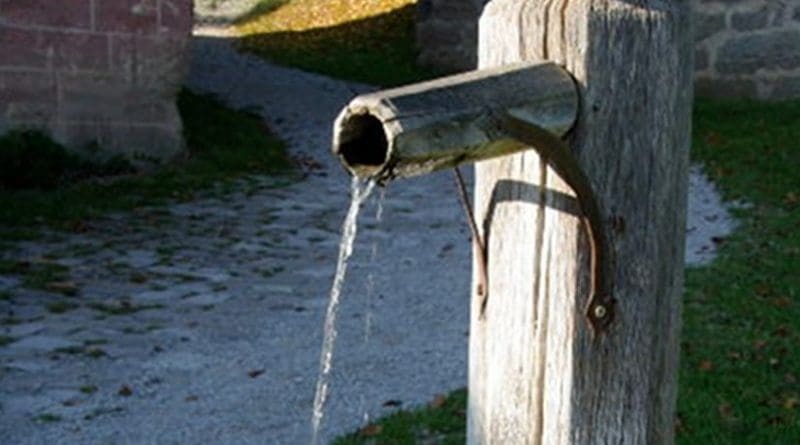Death And The West Bank’s Shadowy ‘Water War’ – OpEd
By Ramzy Baroud
There is a hidden Israeli war on Palestinians that is little known and rarely highlighted. It is a water war, a conflict that has been in the making for decades.
On July 26-27, two separate, but intrinsically linked, events took place in the Ein Al-Hilweh area in the occupied Jordan Valley, near the town of Beita, south of Nablus.
In the first, Jewish settlers from the illegal settlement of Maskiyot began construction work at the Ein Al-Hilweh spring, a source of fresh water for villages and hundreds of Palestinian families in the area. The seizure of the spring had been developing for months, all under the watchful eye of the Israeli army.
Now, the Ein Al-Hilweh spring, like most of the Jordan Valley’s land and water resources, has been annexed by Israel.
Less than 24 hours later, Shadi Omar Salim, a Palestinian municipal employee, was killed by Israeli soldiers in the town of Beita. The Israeli army quickly issued a statement that, as expected, blamed the Palestinian for his own death.
Salim approached the soldiers in a “menacing manner,” holding “what appeared to be an iron bar,” before he was gunned down, the Israeli army claimed.
If the “iron bar” claim were true, it might be related to the fact that Salim was a water technician. Indeed, the Palestinian worker was on his way to open pipes that supply water to Beita and adjacent areas.
Beita, which has witnessed much violence in recent weeks, is facing an existential threat. An illegal Jewish settlement, Givat Eviatar, is being built on top of the Palestinian Sabih mountain. As usual, whenever a Jewish settlement is constructed, Palestinian lives and livelihoods are threatened — thus, the Palestinian protests in the area.
The town’s struggle is a representation of the wider Palestinian fight: Unarmed civilians defying a settler-colonial state that ultimately wants to replace Palestinian villages and towns with Jewish settlements.
However, there is another facet to what may seem a typical story of the Israeli army and Jewish settlers working together to ethnically cleanse Palestinians: Mekorot, the state-owned Israeli water company that literally steals Palestinian water and sells it back to Palestinians at an exorbitant price.
Unsurprisingly, Mekorot operates near Beita. The Palestinian worker Salim was killed because his job of supplying water to the people of Beita was a direct threat to Israeli colonial designs in the region.
Seen in a larger context, Israel not only occupies Palestinian land but also systematically usurps all of its resources, including water, in flagrant violation of international law that guarantees the fundamental rights of an occupied nation.
The occupied West Bank obtains most of its water from the mountain aquifer. In theory, Palestinians have plenty of water, at least enough to meet the minimally required water allotment of 102-120 liters per day, as recommended by the World Health Organization. In practice, however, this is hardly the case. Sadly, most of the water in these aquifers is appropriated directly by Israel. Some call it “water capture” — Palestinians call it, more accurately, “theft.”
While the daily per capita water consumption in Israel is estimated at 300 liters, illegal Jewish settlers in the West Bank consume more than 800 liters per day. The latter number becomes even more outrageous if compared to the meagre 70 liters per day enjoyed by a Palestinian.
This problem is accentuated in the so-called Area C in the West Bank, for a reason. Area C makes up almost 60 percent of the total size of the West Bank and, unlike Areas A and B, is the least populated. It is mostly fertile land and includes the Jordan Valley, known as the “breadbasket of Palestine.”
Despite the fact that the Israeli government in 2019 decided to postpone its formal annexation of the area, a de facto annexation has been in effect for years. The illegal appropriation of the Ein Al-Hilweh spring by Jewish settlers is part of a larger strategy that aims at appropriating the Jordan Valley, one dunum, one spring and one mountain at a time.
Of the more than 150,000 Palestinians living in Area C, almost 40 percent — over 200 communities — suffer from severe shortages of clean water. That shortage could be remedied if Palestinians were allowed to drill new wells, expand current ones, or use modern technologies to develop other sources of freshwater. However, the Israeli army prohibits them from doing so, and even rainwater is off-limits to Palestinians.
“Israel even controls the collection of rainwater throughout most of the West Bank, and rainwater-harvesting cisterns owned by Palestinian communities are often destroyed by the Israeli army,” an Amnesty International report, published in 2017, concluded.
In recent years the situation has only worsened, especially since the idea of officially annexing a third of the West Bank has gained widespread support in the Israeli Knesset and society. Now, every move made by the Israeli army and Jewish settlers in the West Bank is directed to that end, controlling the land and its resources, denying Palestinians access to their means of survival and, ultimately, ethnically cleansing them altogether.
Meanwhile, the Beita protests continue, despite the heavy price being paid. In June, a 15-year-old boy, Ahmad Bani-Shamsa, was killed when an Israeli army bullet struck him in the head. At the time, Defense for Children International-Palestine issued a statement saying that Bani-Shamsa posed no threat to the Israeli army.
The truth is that Beita is under constant Israeli threat along with the Jordan Valley, Area C, the West Bank and the whole of Palestine. The protest in Beita is a protest for land, water and basic human rights. Bani-Shamsa and, later, Salim, were killed in cold blood simply because their protests threatened the grand designs of colonial Israel.
The irony of the situation is that Israel seems to love everything about Palestine — the land, resources, food and even the fascinating history, but not the indigenous Palestinians themselves.

